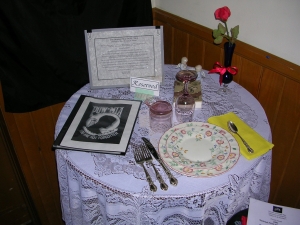Russell Davidson, Chairman

The Korean War and Pfc. John James McDonnell of Bucks County
Preface:
Japan surrendered to the United States September 2, 1945 aboard the USS Missouri. While visiting a WWII Veteran – Scotty in a nursing home conversation led to Scotty reporting that he had flown over the Missouri during the signing and that he witnessed both the end of one war and the beginning of another in the same day.
When asked what he meant, Scotty replied: all we carried was fuel. After we flew over the Missouri, we were ordered to turn and fly north. We flew north over the 38th parallel, turned again and flew south over Korea. This was a massive display of air power. When asked why Scotty replied: I do not know. I guess someone knew something at the time.
The Korean War started June 25, 1950.
It is important to note: The Korean war was a United Nations Conflict. Most all combat operations however were carried out by U.S. forces. Pentagon numbers list: 33,651 KIA’s and 3,262 non-battle deaths. The Korean War yielded over 3 million total fatalities. Often called the Forgotten War, George Herman a CBS correspondent during the War reports for the first 6 months of conflict there was no censorship. Herman states: the press core knew of the pending September 15, 1950 invasion of Inchon: 75,000 troops and 261 naval vessels recaptured the South Korean capital of Seoul. Herman claims there were no press leaks.
On November 25, 1950 General Walton Walker, commander of the 8th Army, upon being informed by front line code breakers of a superior number of Chinese troops advancing into Korea, defied his superior General MacArthur’s orders to go on the offensive and ordered a retreat of the 8th Army. The retreat is credited as saving the Eighth Army from complete destruction. On December 23, 1950, General Walton Walker was killed in a jeep accident amid events compellingly alike the car accident that killed General George Patton December 21, 1945.
General Walker is remembered as a fine commander, a true solider -one who always put his men first. December 1, 1950 General MacArthur ordered press stories, radio broadcast, magazine articles and photographs censored due to what was viewed as a serious breach of security in connection with operations on the Korean peninsula. United Nation troops were repeatedly being hemmed in and fighting desperately against Communist Forces.
Said by George Herman: the main point of the censorship seemed to be to ban the word retreat. Correspondents could say troops moved back to a new prepared position, but the word retreat was banned. During ensuing years, the Korean War history was overshadowed by WWII and the Vietnam War. Operation Glory 1954 sought to reclaim over 8,100 unaccounted for remains. As of December 2018, 7,675 remain unaccounted.
The Doylestown Korean War Monument list 38 Bucks County Veterans under the title: Those we left behind. Among the listed: Army Pfc. John James McDonnell, K Company, 34th Infantry Regiment, 3rd Battalion, 24th Infantry Division. McDonnell was captured July 7, 1950 during fighting in the Chonan region South Korea. Early October 1950, Pfc. McDonnell and an estimated 850 prisoners were assembled, and force to march 90 miles in what is now known as the Tiger Death March.
A reported 566 died in route. Pfc McDonnell, Age 19, died 14 November 1950 at the POW Camp Chung-gang-jin in North Korea, his remains were not recovered. In 2015 the South Korean government issued the second edition of the book: Korean Reborn: A Grateful Nation.
A text sub-title reads:
We honor and remember all those who bravely served during the Korean War.